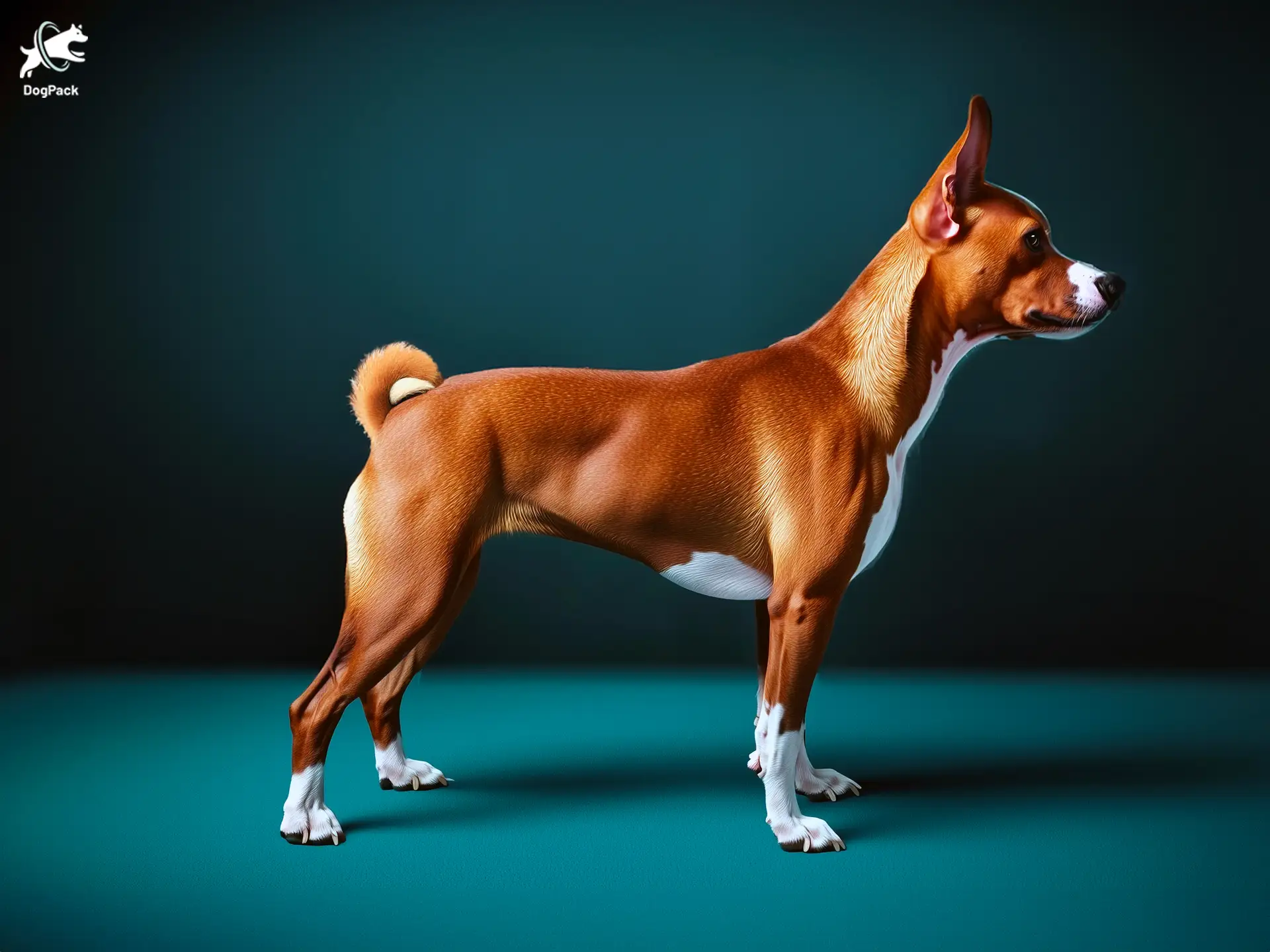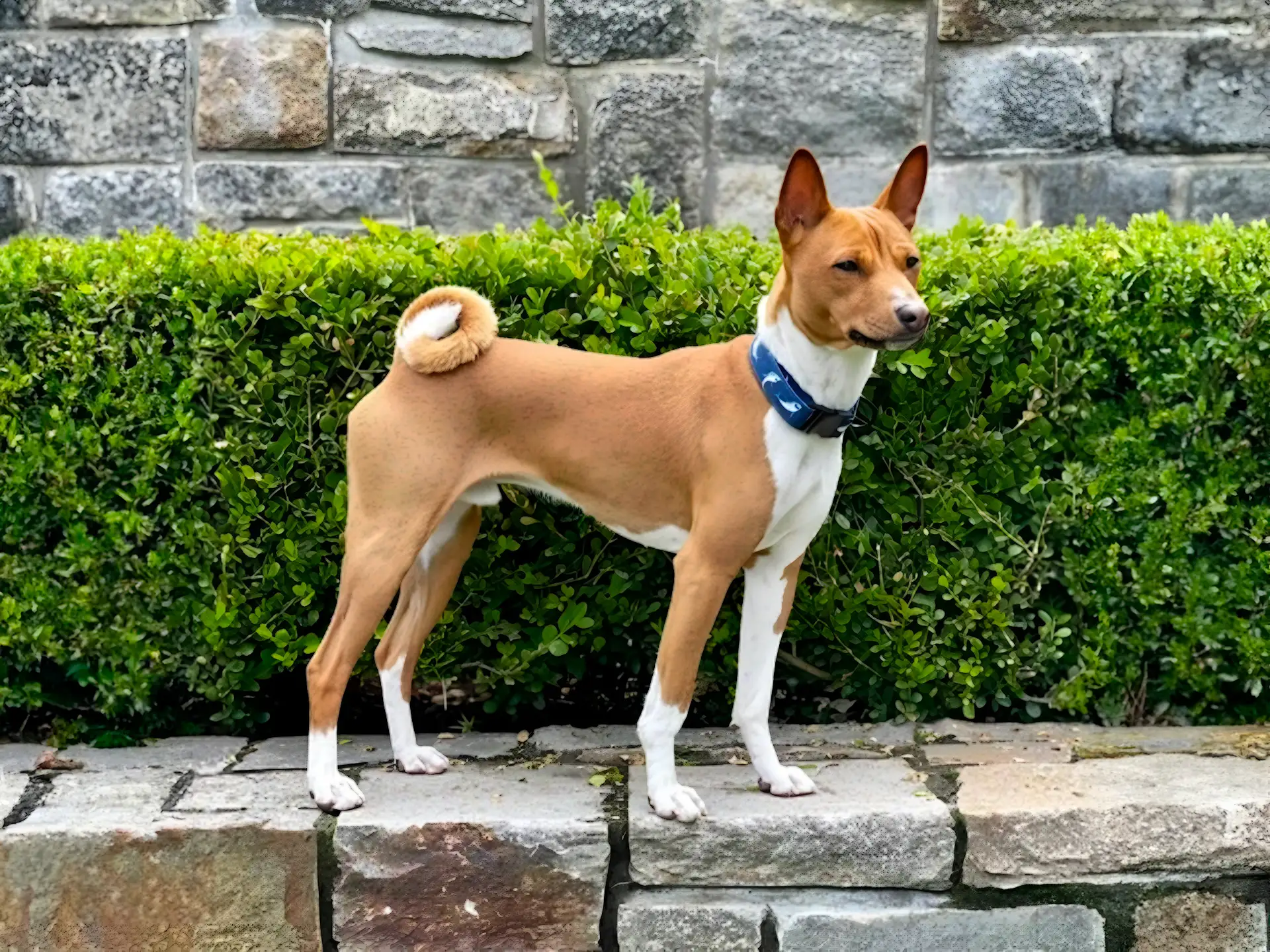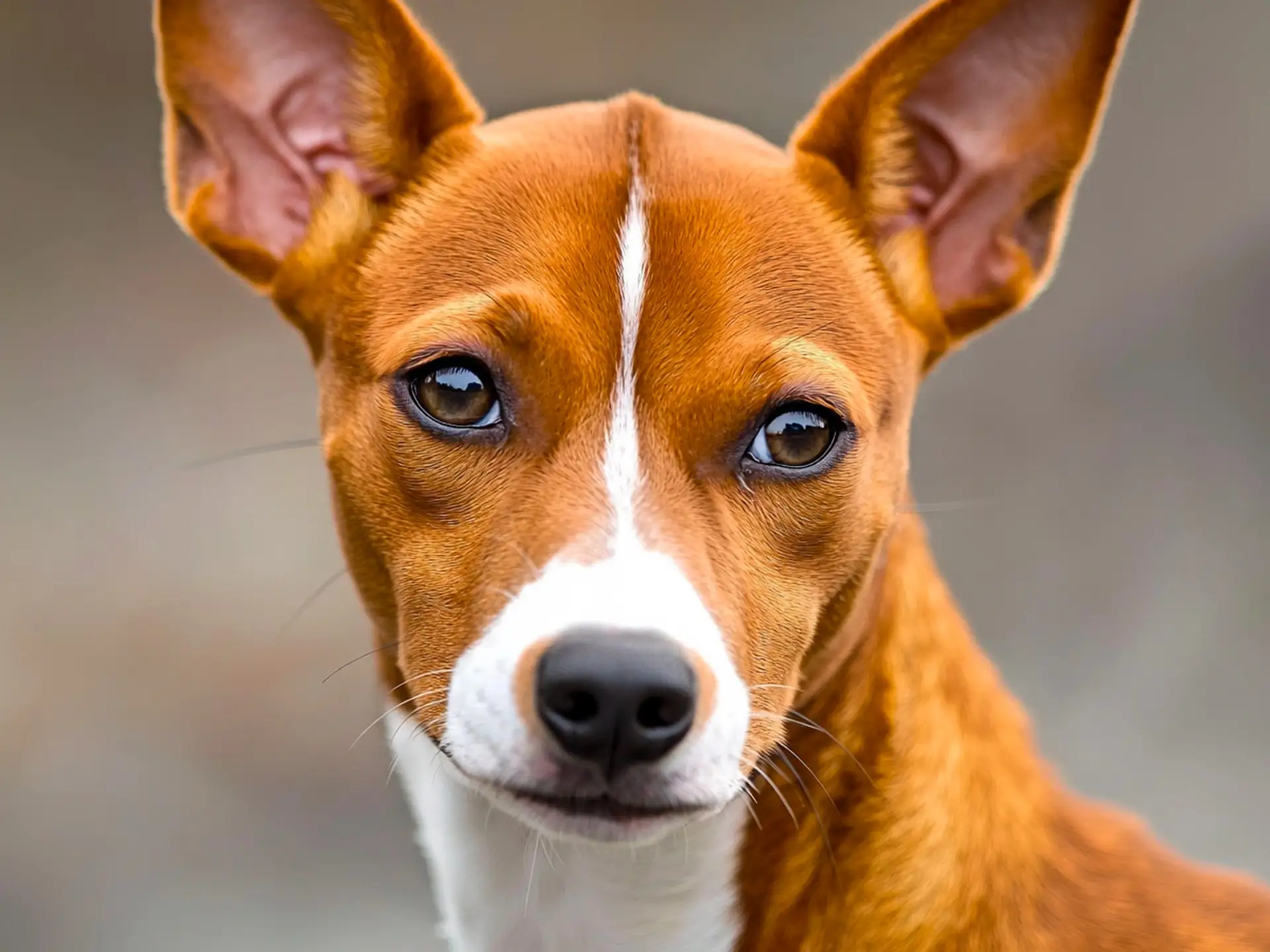Basenji Dog Breed Info & Overview
The Basenji, often called the “barkless dog,” is a remarkable breed originating from Africa. Known for their sleek coats and cat-like independence, Basenjis are intelligent, curious, and full of energy. While they may not bark, they communicate in unique ways, adding to their mysterious charm. Their loyalty and playfulness make them excellent companions for owners who appreciate their spirited, adventurous nature.
Characteristics
Pictures
Breed History
The Basenji is an ancient breed that hails from central Africa, specifically the Congo region. These dogs were prized by African tribes for their hunting prowess, especially in tracking and pointing game. Artifacts and cave paintings dating back thousands of years depict dogs resembling the Basenji, highlighting their long-standing relationship with humans.
The breed’s name, “Basenji,” means “dog of the bush” in several African languages. Early European explorers discovered these dogs in the 19th century and were intrigued by their unique traits, including their barkless nature. Attempts to bring Basenjis to Europe initially failed due to disease, but by the 1930s, successful imports established the breed in the Western world.
Basenjis were officially recognized by kennel clubs in the mid-20th century and have since gained a dedicated following. Their keen senses and agility made them excellent hunters, while their distinctive appearance and behaviors have captivated dog enthusiasts. Today, Basenjis continue to be cherished for their rich history and unique characteristics.
Temperament, Personality
Basenjis are known for their intelligent and independent nature. They often exhibit a curious and alert demeanor, always eager to explore their surroundings. This breed thrives on mental stimulation and can become bored without proper engagement, which sometimes leads to mischievous behavior.
While affectionate with their families, Basenjis can be reserved around strangers. Early socialization is key to ensure they grow into well-adjusted adults. They may not be the most cuddly of dogs, but they form strong bonds with their owners and appreciate companionship.
Basenjis can be a challenge for first-time dog owners due to their stubborn streak. They require patient and consistent training methods. Their high prey drive means they might not get along well with smaller pets, and caution is advised when introducing them to cats or other small animals.
Physical Characteristics
The Basenji is a small, elegant dog with a short, fine coat that comes in various colors, including chestnut red, pure black, brindle, or tricolor, all typically with white markings. They possess a distinctive wrinkled forehead and almond-shaped eyes that give them a quizzical expression.
One of the breed’s most notable features is their tightly curled tail, which sits high and curls over to one side of the back. Their ears are erect and slightly hooded, adding to their alert and intelligent appearance. Overall, they present a balanced and athletic build.
Basenjis are known for their cat-like grooming habits, often cleaning themselves meticulously. They have little to no body odor and shed minimally, which is a bonus for those concerned about cleanliness. Their sleek physique is built for speed and agility, aiding them in their hunting origins.
Health Issues
Basenjis are generally a healthy breed but are prone to certain genetic health conditions. Fanconi syndrome, a kidney disorder, is one of the most significant concerns and requires careful monitoring. Responsible breeders screen for this condition to reduce its prevalence.
Another health issue seen in Basenjis is progressive retinal atrophy (PRA), which can lead to vision loss. Regular eye examinations are recommended to catch any signs early. Hypothyroidism and certain gastrointestinal problems have also been observed in the breed.
Maintaining regular veterinary check-ups is essential to ensure your Basenji remains healthy. A balanced diet, proper exercise, and preventive care can mitigate many health risks. Always consult with your vet about any concerns specific to Basenjis.
Grooming Needs
Basenjis have minimal grooming needs thanks to their short, fine coat and self-cleaning habits. They are low shedders and lack the typical “doggy odor,” making them an excellent choice for those who prefer a cleaner household.
Regular brushing with a soft bristle brush or grooming mitt can help remove loose hairs and keep their coat shiny. Bathing is rarely necessary unless they’ve gotten into something messy, as they tend to keep themselves quite clean.
Don’t forget routine care like nail trimming, teeth brushing, and ear cleaning. Basenjis can be sensitive about their feet, so it’s best to get them accustomed to grooming practices from a young age to make the process smoother.
Exercise Requirements
Basenjis are energetic dogs that require daily exercise to keep them happy and healthy. A brisk walk or active play session for at least an hour each day is recommended to meet their physical needs.
The breed has a strong prey drive and loves to chase, so secure, fenced areas are ideal for off-leash play. Engaging in activities like agility training or lure coursing can provide both mental and physical stimulation.
Without adequate exercise, Basenjis can become bored and may develop destructive behaviors. Keeping them engaged with interactive toys and puzzles can also help burn off energy and satisfy their curious nature.
Training Tips
Training a Basenji can be a rewarding yet challenging experience due to their independent streak. They are intelligent but may not always be eager to please, so using positive reinforcement techniques is essential.
Consistency and patience are key when working with this breed. Short, varied training sessions can help keep their attention. Incorporating games and rewards will make learning more enjoyable for your Basenji.
Early socialization is crucial to help Basenjis become well-rounded adults. Exposing them to different environments, people, and other animals can reduce potential shyness or reactivity. Consider enrolling in puppy classes for structured socialization opportunities.
Nutrition, Diet
Feeding your Basenji a high-quality dog food appropriate for their age, size, and activity level is important for their overall health. Due to their energetic nature, they may require a diet rich in protein to support muscle development and maintenance.
Portion control is vital to prevent overeating and potential weight gain. Typically, Basenjis consume about 3/4 to 1 cup of dry food per day, divided into two meals. Always consult your veterinarian to determine the exact amount suitable for your dog’s specific needs.
Some Basenjis can be prone to food sensitivities. Monitoring their reaction to new foods and avoiding ingredients that cause issues can help maintain digestive health. Fresh water should always be available, and treats should be given in moderation.
Adoption, Breeders
If you’re considering adding a Basenji to your family, it’s important to find a reputable breeder who performs health screenings on their dogs. The Basenji Club of America is an excellent resource for locating responsible breeders.
Adoption is another wonderful option. There are breed-specific rescue organizations, such as the Basenji Rescue and Transport, that help Basenjis in need of a home. Adopting an adult dog can be rewarding and provides a loving home to a dog in need.
Avoid purchasing from pet stores or unverified online sellers, as these sources may support puppy mills or unethical breeding practices. Always ask for health certificates and meet the puppy’s parents if possible to ensure you’re getting a healthy Basenji.
Family Pet?
Basenjis can make delightful family pets for the right household. They are affectionate with their family members and can be good with older children who understand how to interact with dogs respectfully.
The breed’s high energy level means they do well in active households where they can participate in family activities. However, their independent nature might not be suitable for families seeking a highly obedient or easy-going pet.
Basenjis may not be the best choice for homes with small pets due to their strong prey drive. Early socialization and training can help, but supervision is recommended when they’re around cats or small animals.
Right For You?
Deciding if a Basenji is right for you depends on your lifestyle and expectations. If you appreciate a dog with a unique personality, are patient with training, and can provide ample exercise, this breed could be a great fit.
Basenjis are best suited for owners who enjoy an active lifestyle and are experienced with independent dog breeds. They thrive in environments where they receive plenty of mental and physical stimulation.
If you’re looking for a low-shedding, clean, and quiet dog, the Basenji ticks those boxes. However, be prepared for their occasional stubbornness and ensure you’re ready to commit to their care requirements.
Conclusion
Bringing a Basenji into your life can be a rewarding experience if you’re prepared for their unique traits. Their intelligence, energy, and independence make them stand out among dog breeds. With the right care and attention, a Basenji can become a cherished companion who brings joy and excitement to your home.
FAQs
-
Why do Basenjis not bark?
Basenjis are known as the barkless dog because their larynx is shaped differently, which limits their ability to bark. Instead, they make a unique yodel-like sound called a “baroo.” This trait is inherited from their ancestors in Africa.
-
Are Basenjis good for people with allergies?
Basenjis are considered a hypoallergenic breed due to their short coat and minimal shedding. While no dog is truly allergen-free, Basenjis produce less dander, making them a better option for some people with allergies.
-
Can Basenjis be left alone during the day?
Basenjis can become anxious or bored if left alone for long periods. They prefer having company and may engage in destructive behavior when isolated. It’s best to ensure they have mental stimulation or consider doggy daycare if you’re away often.
-
Do Basenjis get along with other dogs?
Basenjis can get along with other dogs, especially if they’re raised together from a young age. However, they may exhibit dominance or aggression toward unfamiliar dogs. Proper socialization is important to promote positive interactions.
-
What kind of climate is suitable for a Basenji?
Basenjis originated in Africa and prefer warmer climates. They have a low tolerance for cold weather due to their short coat. In cooler climates, they may need a sweater or jacket during walks to stay comfortable.
Breed Ratings
Basenjis are intelligent but can be independent thinkers, making training a unique challenge that requires patience.
This breed loves to play and can be quite entertaining with their antics, keeping you amused with their curiosity and energy.
Basenjis have high energy levels and need regular physical activity to prevent boredom and destructive behaviors.
With minimal shedding, Basenjis are a low-maintenance breed when it comes to fur around the house.
They possess a strong prey drive due to their hunting background and may chase small animals if not properly managed.
Their short coat and self-grooming habits make them exceptionally easy to care for in terms of grooming needs.
Basenjis can be stubborn and may not respond well to traditional training methods; consistency is key.
They prefer companionship and can become bored or anxious if left alone for extended periods.
Known as the barkless dog, they rarely bark but may vocalize through yodels or other sounds.
Basenjis drool very little, which is a plus for owners who prefer a cleaner dog.
They can be friendly with other dogs if socialized early but may exhibit dominance or aggression otherwise.
Generally healthy but prone to certain genetic conditions; regular vet care is important.















